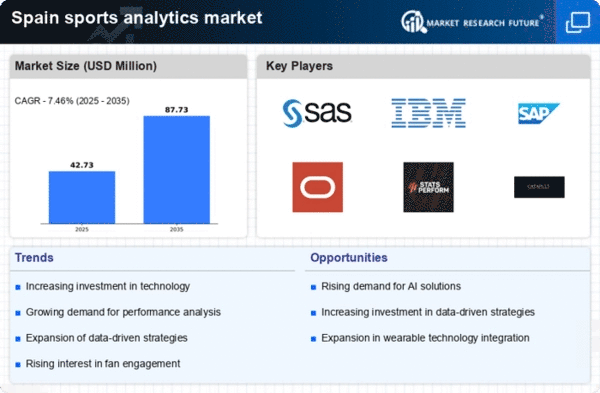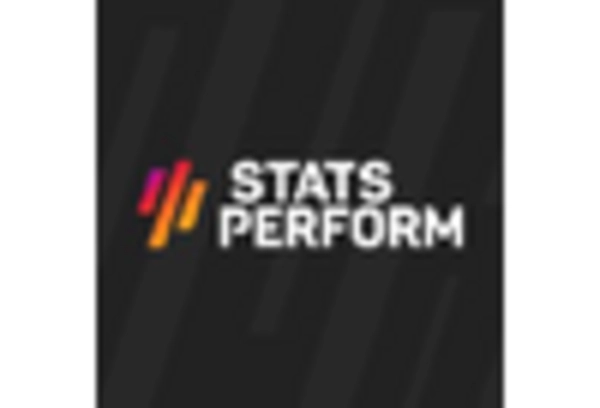Emergence of E-Sports Analytics
The rise of e-sports in Spain has introduced a new dimension to the sports analytics market. With millions of fans and participants, e-sports organizations are increasingly leveraging analytics to enhance player performance and viewer engagement. The market for e-sports analytics is projected to grow significantly, potentially reaching €50 million by 2027. This growth is indicative of the broader trend within the sports analytics market, where traditional sports are beginning to adopt strategies from the e-sports sector. As e-sports continue to gain traction, the demand for specialized analytics tools tailored to this unique environment is likely to increase, creating new opportunities for innovation and investment.
Growing Investment in Sports Technology
The sports analytics market in Spain is experiencing a surge in investment as organizations recognize the value of data-driven insights. In recent years, sports teams and organizations have allocated substantial budgets towards technology that enhances performance analysis and fan engagement. For instance, the market is projected to reach approximately €200 million by 2026, reflecting a compound annual growth rate (CAGR) of around 15%. This influx of capital is likely to drive innovation in analytics tools, enabling teams to optimize player performance and improve strategic decision-making. As a result, the sports analytics market is becoming increasingly competitive, with both established companies and startups vying for a share of the growing demand.
Rising Popularity of Data Analytics in Sports
The increasing acceptance of data analytics within the sports community is a pivotal driver for the sports analytics market in Spain. Coaches, managers, and players are increasingly utilizing analytics to enhance training regimens and game strategies. This trend is evidenced by the fact that over 60% of professional teams in Spain have integrated analytics into their operations. The sports analytics market is thus witnessing a transformation, as data-driven methodologies become standard practice. This shift not only improves team performance but also attracts sponsorships and partnerships, further fueling market growth. As analytics tools become more sophisticated, their adoption is expected to expand across various sports disciplines.
Integration of Artificial Intelligence in Sports
The integration of artificial intelligence (AI) into the sports analytics market in Spain is revolutionizing how teams analyze performance data. AI technologies enable more accurate predictions and insights, allowing teams to make informed decisions based on real-time data. This trend is particularly evident in player scouting and injury prevention, where AI algorithms analyze vast datasets to identify potential risks and opportunities. The sports analytics market is thus evolving rapidly, with AI-driven solutions becoming essential for competitive advantage. As AI technology continues to advance, its application in sports analytics is expected to expand, potentially reshaping the landscape of sports management and strategy.
Increased Focus on Athlete Health and Performance
The sports analytics market in Spain is increasingly prioritizing athlete health and performance, driven by a growing awareness of the importance of well-being in sports. Teams are utilizing analytics to monitor player health metrics, optimize training loads, and prevent injuries. This focus is reflected in the fact that approximately 70% of sports organizations in Spain are investing in health analytics tools. The sports analytics market is thus adapting to meet the needs of athletes and coaches, ensuring that performance enhancement does not come at the expense of health. As the emphasis on athlete welfare continues to rise, the demand for analytics solutions that support health monitoring is likely to grow.
















